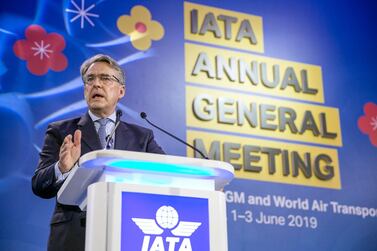Despite the economic and political uncertainty of Brexit, Britain remains Emirates’ most profitable market in Europe, the airline’s president said.
Since the UK voted to leave the European Union in June 2016, sterling has lost over 17 per cent of its value against the dollar and foreign investment in Britain has waned. The aviation industry has also been impacted, but mainly carriers earning most of their revenues in sterling or those that rely heavily on the British market.
“Despite all of this, the United Kingdom remains one of the strongest markets, definitely the most profitable market on the Emirates network during the course of this hiatus," Tim Clark told participants at the Aviation Festival in London on Thursday. "We’ve been growing our business here around 6 to 8 per cent a year despite the [political] problems and the currency depreciation.”
“We serve 22 counties in Europe. 20 per cent of our production comes into the UK and the country accounts for 55 per cent of our [European] profit,” he added.
Most of the demand comes from London, which is trailed by Birmingham, Edinburgh, Glasgow, Manchester and Newcastle.
The UK market "continues to move ahead and defies what’s going on in other parts of the world ... [and] continues to be attractive in all segments”, Mr Clark added.
A weaker pound, which hit a 2016 low this week, has helped drive inbound tourism but also a high level of domestic investment into the UK.
“If you look at some of the micro-indicators, with regards to hotel occupancies, particularly in this city at this time everybody is running full," Mr Clark said. "Even Heathrow, with its difficulties dealing with capacity constraints with the third runway, is still growing its business,” he added.
Emirates runs six daily A380 flights at London Heathrow and another three at London Gatwick, with an average load factor of 93 per cent, Mr Clark said.
But despite this, the airline is going through a fleet review as the superjumbo programme has been terminated by Airbus and Emirates will say goodbye to its last A380 in the 2030s. To begin replacing the superjumbos, Emirates has orders for 150 Boeing 777X jets, but deliveries have been delayed to start in summer 2020.
Referring to the wider economic challenges, as well as some of the challenges associated with weak sterling, Mr Clark said there was a reduction in demand in some key international markets, including Hong Kong as a result of political unrest and Argentina, with a weakened peso.
Although earlier this year, one of the runways at Dubai Airport was down for six weeks, Mr Clark said that the airline had “still been ahead of the game” financially and this, coupled with the fact Emirates has been more profitable than it was at this stage last year, would be reflected in the airline’s half-year financial results due next month.
Mr Clark said profitability was increased by evaluating its routes and its fleet, including the synergy with Flydubai’s network from 2017.







